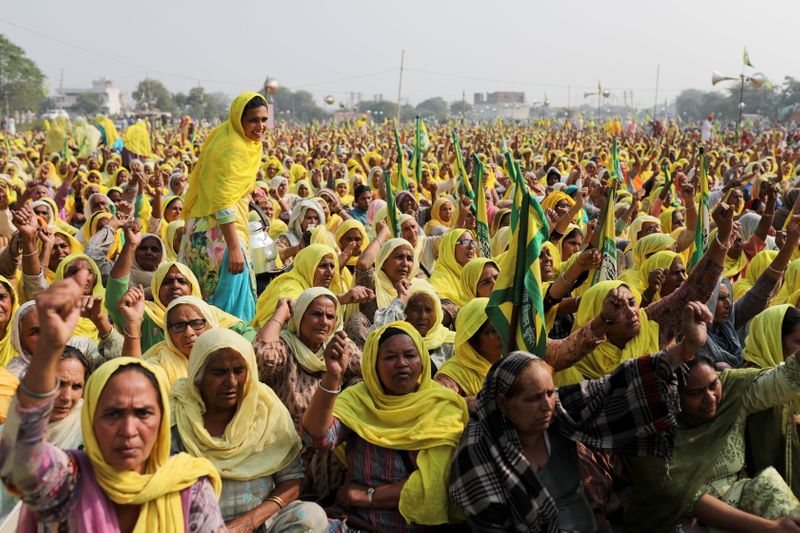By Mayank Bhardwaj and Rajendra Jadhav
NEW DELHI (Reuters) -India's repeal of agriculture laws aimed at deregulating produce markets will starve its vast farm sector of much-needed private investment and saddle the government with budget-sapping subsidies for years, economists said.
Late last year, Prime Minister Narendra Modi's government introduced three laws meant to open up agriculture markets to companies and attract private investment, triggering India's longest-running protest by farmers who said the reforms would allow corporations to exploit them.
With an eye on a critical election in populous Uttar Pradesh state early next year, Modi agreed to rescind the laws in November, hoping to smooth relations with the powerful farm lobby which sustains nearly half the country's 1.3 billion people and accounts for about 15% of the $2.7 trillion economy.
But by shelving the most ambitious overhaul in decades, Modi's backtracking now seemingly rules out much-needed upgrades of the creaky post-harvest supply chain to cut wastage, spur crop diversification, and boost farmers' incomes, economists said.
"This is not good for agriculture, this is not good for India," said Gautam Chikermane, a senior economist and vice president at New Delhi-based Observer Research Foundation.
"All incentives to shift towards a more efficient, market-linked system (in agriculture) have been smothered."
The u-turn does allay farmers' fears of losing the minimum price system for basic crops, which growers say guarantees India's grain self-sufficiency.
"It appears the government realised that there's merit in the farmers' argument that opening up the sector would make them vulnerable to large companies, hammer commodities prices and hit farmers' income," said Devinder Sharma, a farm policy expert who has supported the growers' movement.
But the gruelling year-long standoff also means no political party will attempt any similar reforms for at least a quarter-century, Chikermane said.
And, in the absence of private investment, "inefficiencies in the system will continue to deliver wastage and food will continue to rot," he warned.
COLOSSAL WASTE
India ranks 101 out of 116 countries on the Global Hunger Index, with malnutrition accounting for 68% of child deaths.
Yet it wastes around 67 million tonnes of food every year, worth about $12.25 billion - nearly five times that of most large economies - according to various studies.
Inadequate cold-chain storage, shortages of refrigerated trucks and insufficient food processing facilities are the main causes of waste.
The farm laws promised to allow private traders, retailers and food processors to buy directly from farmers, bypassing more than 7,000 government-regulated wholesale markets where middlemen's commissions and market fees add to consumer costs.
Ending the rule that food must flow through the approved markets would have encouraged private participation in the supply chain, giving both Indian and global companies incentives to invest in the sector, traders and economists said.
"The agriculture laws would have removed the biggest impediment to large-scale purchases of farm goods by big corporations," said Harish Galipelli, director at ILA Commodities India Pvt Ltd, which trades farm goods. "And that would have encouraged corporations to bring investment to revamp and modernise the whole food supply chain."
Galipelli's firm will now have to re-evaluate its plans.
"We have had plans to scale up our business," said Galipelli. "We would have expanded had the laws stayed."
Other firms specialising in warehousing, food processing and trading are also expected to review their expansion strategies, he said.
PERISHABLE PRICES YO-YO
Poor post-harvest handling of produce also causes prices of perishables to yo-yo in India. Only three months ago, farmers dumped tomatoes on the road as prices crashed, but now consumers are paying a steep 100 rupees ($1.34) a kg.
The laws would have helped the $34 billion food processing sector grow exponentially, according to the Confederation of Indian Industry (CII), an industry group.
Demand for fruits and vegetables would have gone up. And that would have cut surplus rice and wheat output, slicing bulging stocks of the staples worth billions of dollars in state warehouses, economists said.
"Crop diversification would also have helped rein in subsidy spending and narrow the fiscal deficit," said Sandip Das, a New Delhi-based researcher and farm policy analyst.
Food Corporation of India (FCI), the state crop procurement agency, racked up a record 3.81 trillion rupees ($51.83 billion) in debt by last fiscal year, alarming policymakers and inflating the country's food subsidy bill to a record 5.25 trillion rupees ($70.16 billion) in the year to March 2021.
However, while the federal government now has limited scope for change, local authorities "can opt for reforms provided they have the political will to do so," said Bidisha Ganguly, an economist at CII.
Similarly, venture capital-funded startups have also expressed interest in India's agriculture sector.

"Agritech, if it is allowed to take root, has the potential to enable a better handshake of farmers and consumers through their technological platforms," Chikermane said.
(1 = 74.83 rupees)